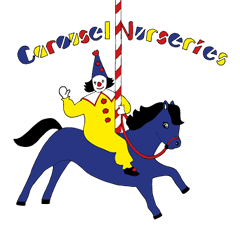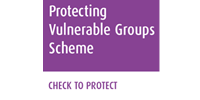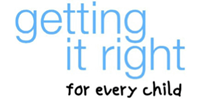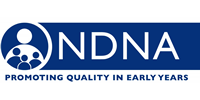Education and Development
Pre-Birth to Three
Positive Outcomes for Scotland's Children and Families
This is a government led programme to help inform and support all staff
working with and on behalf of Scotland's youngest children.
This national guidance sets the context for high quality care
and education and seeks to identify key features that support
and promote evidence-based approaches.
- It aims to improve and enhance evidence-based practice by building on existing knowledge and work with babies, young children and their families.
- It recognises the importance of pregnancy and the first years of life in influencing children's development and future outcomes.
- It acknowledges that staff appreciate that babies arrive into the world
with their individual personalities, ready to adapt to, and be influenced
by, their environment.
- For staff to be confident that they are providing the best experiences for
babies and children, they need to know why it is essential that they get
it right for every child in these most critical years.
- It lays a sound foundation for children's learning and development and
will ensure a smooth and coherent transition for all children as
they begin to engage with Curriculum for Excellence 3-18.
The main aim of Pre-Birth to Three: Positive Outcomes for Scotland's Children and
Families is to promote continuing professional development.
It will also:
- Facilitate effective partnership working for the benefit of every child;
- Build confidence, capability and capacity across the current workforce;
- Inform students engaged in pre-service training programmes;
- Provide a common reference source to promote reflection, debate and discussion;
- Share and inform ways in which staff support children and families;
- Improve and enhance evidence-informed practice.
Drawing upon national and international research, Pre-Birth to Three: Positive
Outcomes for Scotland's Children and Families sets out four key principles for best
starts and positive outcomes, through which effective support and learning opportunities
for very young children can be promoted.
The four key principles are:
- Rights of the Child
- Relationships
- Responsive Care
- Respect
Based on these key principles, the guidance proposes sensitive and
respectful approaches and ways of interacting that are beneficial to children and families. Nine
features have been identified to put the key principles into practice. These nine features
are all equally significant and are therefore not presented hierarchically. They are:
- Role of Staff Attachments Transitions
- Partnership Working Environments Literacy and Numeracy
- Health and Wellbeing Play Observation, Assessment and Planning
All of the key principles and features of practice are interrelated and interdependent.
How they are used to inform practice is a question for staff, children and families.
Throughout the guidance, there is recognition of the various and complementary ways
in which very young children are cared for in different settings. It is based on the
fundamental understanding that relationships, environment, health, family and community
all influence and shape children's development.
Whilst children's early experiences play an important part in shaping their
future attitudes and dispositions, very young children are capable individuals
in their own right, and, with appropriate support, can develop resilience to
deal with many of life's challenges.
Curriculum for Excellence
The Curriculum for Excellence:
• Is a government led programme for all who contribute to the education of Scotland’s children and young people.
• By exploring the entire set of experiences and outcomes of children, staff are able to see how the curriculum develops from the early years to the end of S3 or even further.
• Although broad in experiences and outcomes, the actual framework is less detailed and prescriptive than previous curriculum advice.
• Provides professional space for teachers and nursery staff to use in order to meet the varied and individual needs of all children and young people. This is most important in the early years when formal education begins through play and interpersonal skills.
• Recognises the importance of the quality and the nature of learning experiences to achieve active engagement, motivation and depth of learning.
• Uses four capacities and eight curriculum areas to ensure your child receives the best education possible.
The Four Capacities are:
Successful Learners
Aim : To encourage children to learn and enjoy learning.
By creating a stimulating and challenging environment within Carousel Nurseries, children are encouraged to explore and extend their learning within the different curriculum areas. They can experiment and find their own way of discovering the world, setting them up for lifelong learning and the ability to learn on their own. A successful learner continues to learn, finding new challenges and experiences wherever they go.
Successful Learners have:
Enthusiasm and motivation for learning
Determination to reach high standards of achievement
Openness to new ideas and thinking
Are able to:
Use literacy, communication and numeracy skills
Use technology for learning
Think creatively and independently
Learn independently and as part of a group
Make reasoned evaluations
Link and apply different types of learning in new situations
Confident Individuals
Aim : To encourage children to grow and develop as individuals with individual goals and abilities.
Pre-school education within Carousel Nurseries centres on each child and their individual needs to ensure the child develops confidence in their own abilities and can use their own unique skills and talents to achieve their full potential. Confidence is key to successful learning and children are actively encouraged to plan and participate in their own learning story and celebrate their achievements to build self esteem and skills for the future.
Confident Individuals have:
Self respect
A sense of physical, mental and emotional wellbeing
Secure values and beliefs
Ambition
Are able to:
Relate to others and manage themselves
Pursue a healthy and active lifestyle
Be self aware
Develop and communicate their own beliefs and view of the world
Live as independently as they can
Assess risk and take informed decisions
Achieve success in different areas of activity
Responsible Citizens
Aim : To educate children in citizenship and their roles and responsibilities within the community.
Children are encouraged to learn about personal responsibilities and what it means to be a part of the wider world. Children are given responsibilities within nurseries and are learning to make informed decisions and choices.
Responsible Citizens:
Have respect for others
Take part in community life
Are able to:
Develop knowledge an understanding of the world
and Scotland’s place in it
Understand different beliefs and cultures
Make informed choices and decisions
Effective Contributors
Aim : To encourage children to create and share ideas with others.
Children are encouraged to think creatively and develop communication skills to solve problems and learn to work individually and in groups. Children are encouraged to take part in challenging activities and persevere with them.
Effective Contributors have:
An enterprising attitude & self reliance
Are able to:
Communicate in different ways and in different settings
Work in partnerships and in teams
Take the initiative and lead
Apply thinking in new settings
Create and develop ideas, solve problems
There are 8 curriculum areas, however it is the responsibility of all practitioners to ensure Literacy, Numeracy and Health & Wellbeing are cross curricular:
Literacy across learning
Language and literacy are of personal, social and economic importance. Our ability to use language helps us develop and express our emotions, thinking and learning and enables personal development. Children learn through communication; literacy enables them to engage fully in society and learning. Nurseries explore rhyming ie rhyming words, nonsense rhyming and sounds used in language, ie alphabet sounds used in language. We use stories in book, visual or audio format to explore events and characters and share likes and dislikes to form opinions of individual thought.
Numeracy across learning
Numeracy is a life skill which allows individuals to solve problems, interpret information and make informed decisions based on calculations. Nursery children are encouraged to use numeracy in everyday life through use of a wide range of resources such as a calculator, numbers, clocks, electronic tills and money in role play activities.
Health and Wellbeing across learning
Learning through health and wellbeing promotes confidence, independent thinking and positive attitudes. It ensures that children develop the knowledge and understanding, skills and capabilities they need for mental, emotional, social and physical wellbeing now and in the future. This is achieved by fostering a safe, caring, supportive and purposeful environment that enables the development of friendships and mutual respect.
At Carousel Nurseries we aim to provide a broad and balanced curriculum with a range of experiences and outcomes to prepare our children for life and for school.
The Eight Curriculum areas are :
Numeracy & Maths, Literacy & English, Health & Wellbeing, Religious & Moral Education, Social Studies, Technologies, Sciences, Expressive Arts.
Numeracy & Maths
Children are given regular opportunities to develop mathematical skills through sorting items according to shape, size, colour, weight etc. and through a variety of experiences using volume and capacity. We also use role play of real life scenarios such as ‘The Cafe, ‘The Supermarket’ to develop numeracy and money awareness.
The 3-5 playroom has a well equipped maths area which offers children the opportunity to understand and use mathematical processes such as matching, sorting, grouping, sequencing, counting measuring and problem solving.
Children are also encouraged through play to identify numbers up to 10 and to recognise 2D and 3D shapes. Development of positional & descriptive language such as more/less, over/under, first/last and heavy/light is promoted during Nursery play.
The three mathematical areas covered in pre-5 education are:
Number, money, measure
Shape, position and movement
Information handling
From the early stages, children should experience success in mathematics and develop the confidence to take risks, ask questions and explore alternative solutions without fear of being wrong. With Carousel they will enjoy exploring and applying mathematic concepts to understand problems, explain their thinking and present their solutions to others in a variety of ways.
Literacy & English
(Listening & Talking
Reading & Writing)
The children look forward to circle time and together time where they have the opportunity to talk about their own experiences and express their emotions. These sessions help develop children’s confidence and self esteem and encourage the use of language for a variety of purposes eg. to describe, explain, predict, ask questions and develop ideas. Children also learn to ‘take turns’ in conversation and to listen carefully with enjoyment using both their eyes and ears whilst another child is speaking. Together time also enhances children’s ability to express needs, thoughts and feelings with increasing confidence in talk and non-verbal language.
A designated writing area is located in the 3-5 playroom, providing children with a selection of writing materials including a variety of papers, envelopes, diaries, chalk boards, magnetic letters, etc. These tools enable children to experiment with symbols and letters and in some cases words. This helps them to recognise some familiar words and letters. Children are encouraged to ‘make their mark’ and ‘write’ and opportunities are available in every area of the Nursery.
Each playroom has a cosy story corner where children can choose from a range of books both large and small covering fact, fiction, rhymes and poems, as well as magazines, newspapers, etc. Children are encouraged during Quiet Time to select a book to read to help them understand some of the language and the layout. Books are used in Nursery to find interesting information and to enable children to recognise the link between the spoken and the written word. Story Time is always a favourite in Nursery and children listen and respond to favourite stories, rhymes and poetry. The use of puppets and visual aids help stories come to life and further enhances children’s enjoyment and listening skills ensuring a love of literacy and discovery of language with which to begin their school career.
Health and Wellbeing
Health and wellbeing is important to enable children to experience positive aspects of healthy living and activities. This will help develop mental, emotional, social and physical skills throughout life. Effective learning through health and wellbeing promotes confidence, independent thinking and positive attitudes.
There are six main areas of Health and Wellbeing:
Mental, emotional, social and physical wellbeing
Planning for choices and changes
Physical education, physical activity and sport
Food and health
Safety
Relationships
Through play and Nursery routines children develop an appreciation of the needs and feelings of others and learn to follow simple rules. Circle Time is used to encourage the development of high self-esteem and positive attitude towards others.
Awareness of the importance of looking after your body to keep it healthy and fit is encouraged in the Nursery. Children learn which foods are ‘healthy’ for the body and which are not. The Nursery encourages healthy eating, healthy snacks (eg milk, water, fruit & veg) are provided morning and afternoon. A healthy baking activity is carried out within the nursery once a week and parents are encouraged to provide healthy lunch boxes.
The importance of personal hygiene is discussed and implemented in Nursery routines through hand washing before handling food and after using the toilet.
Children are taught good oral hygiene routines in line with our oral health programme ‘Smile Too’. Every child brushes their teeth daily whilst in nursery and procedures for dispensing toothpaste and cleaning and storage of toothbrushes are implemented following the National Toothbrushing Standards.
A variety of large equipment for physical activity is provided within the nursery. Opportunities are also given to develop spatial awareness and co-ordination of movement using similar apparatus, ie balls, hoops, bean bags, etc. Children are encouraged to cooperate with others during physical play with partners or as a member of a team.
Activities such as drawing, painting, cutting and lacing are made available to encourage and help develop fine motor skills. Further structured activities in fine movement skills are also offered during planned learning activities. The Dumbarton nursery also has a purpose built Soft Play Room with a ball pool where children can enjoy free play.
Religious and Moral Education
(Christianity, World Religions)
Religious and moral education enables children to explore the world’s major religions and views to consider the challenges posed by these beliefs. It is a process where children engage in a search for meaning, value and purpose in life. In the early years a child develops an understanding of individual rights and responsibilities and the importance of caring for, sharing and co-operating with others.
Children are encouraged to make decisions and choices, share, take turns and develop a caring attitude towards each other and their environment.
Through the celebration of various multicultural and religious festivals children become aware of the importance of these events in people’s lives. Examples of festivals celebrated in Nursery are Diwali, Hanukkah, Christmas, Easter, Chinese New Year, etc.
Social Studies
(Past Events & Societies,
Place & Environment,
Economy & Business)
Through social studies children develop an understanding of the world by learning about other people and their values in different times, places and circumstances. They learn about the environment and how it has been shaped. In the pre-school years children learn about the past present and future and can make a personal link to these using special events in their lives. They learn to explore and discover their local environment and to develop an awareness of the world around them.
At Carousel Nurseries we look at where different foods come from. We talk about journeys we make and different ways we travel. We learn about seasons and weather and about local shops and services and where to go when we need something. We use models and drawings to represent the world around us.
Technologies
The technologies curriculum area focuses on developing skills through creative, practical and work-related activities. Learning technologies enables children to be informed, skilled, thoughtful, adaptable and enterprising citizens. At Carousel Nurseries we encourage curiosity and problem solving, teamwork, motivation to succeed, creativity, innovation, critical thinking, discussion and debate, presentation skills and how to collect and use information. The experiences and outcomes are intended to tap into children’s natural inventiveness and their desire to create and work in practical ways.
Children’s awareness of Information, Communication and Technology (ICT) is developed through provision of a wide range of materials i.e. Calculators, electronic toys, telephones, radio, television, etc. A computer, printer, scanner, digital camera and camcorder are used to encourage children to develop an understanding of their uses.
A variety of educational software and programmable toys are also used in the nursery to enhance children’s interest and learning.
Sciences
(Biodiversity, Energy, Plant Processes, Space, Forces & Electricity, Biological Systems, Materials, Topical Science)
Through learning science children develop important skills to become creative, inventive and enterprising adults in a world where the skills and knowledge of the sciences are needed across all sectors of the economy. At Carousel Nurseries children are encouraged to develop a curiosity and understanding of their environment and their place in the living, material and physical world. They use sand, water and creative play to explore and learn basic principles of science such as gravity. Each child learns to ask questions, hypothesise, plan and design an activity or experiment, select tools, observe, collect, measure and record evidence e.g. draw a picture to show today’s weather. This gives each child confidence in their abilities and encourages them to look for solutions to problems and to find the answers to their own questions.
An introduction to early science occurs as a result of involvement in topics such as ‘nature’, ‘living things’, ‘our world’, ‘weather’ and ‘space’, through which children are given the opportunity to make discoveries and develop a sense of wonder about the world.
Expressive Arts
(Art & Design, Dance, Drama, Music)
Through exposure to a wide variety of media and techniques within our playrooms, children are encouraged to explore experiment, design and create their own models and works of art using all of their senses. The inspiration and power of the arts play a vital role in enabling our children to enhance their creative talent and develop their artistic skills.
Each child is given the space to create their own identity and talents, thinking innovatively, solving problems and meeting challenges. The availability of free choice art & craft activities allows children to express personal thoughts and feelings in models and pictures sometimes whilst listening to a variety of maestros and tempos in the background! Nursery day-to-day routines and practices encourage children to develop their powers of observation using their sense of sight, sound, touch, smell and taste.
Music plays an important role in the nursery programme and children are introduced to a large selection of action songs and rhymes. Percussion instruments are available to be used by the children to provide both enjoyment and personal expression.
Children are encouraged to listen to and respond to poems, rhymes and stories and dramatise these using verbal & non-verbal language, body movements and puppets. They learn to understand the emotions, personal space boundaries and different opinions of other children and adults. Expressive Arts plays an important role in supporting children to recognise and value the variety and vitality of culture locally, nationally and globally.
Imaginative play is promoted by using role play in the form of dressing up areas, shop and home set ups which encourage children to recreate familiar and invent new situations providing a good stimulus for verbal and non-verbal language.












